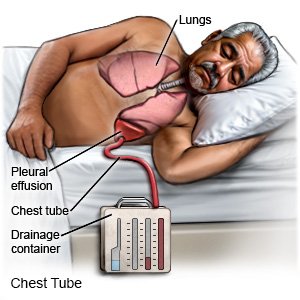Gunshot Wound to the Chest
Medically reviewed by Drugs.com. Last updated on Apr 6, 2025.
A gunshot wound (GSW) to the chest may cause damage to your heart, lungs, esophagus, ribs, or major blood vessels.
WHILE YOU ARE HERE:
Informed consent
is a legal document that explains the tests, treatments, or procedures that you may need. Informed consent means you understand what will be done and can make decisions about what you want. You give your permission when you sign the consent form. You can have someone sign this form for you if you are not able to sign it. You have the right to understand your medical care in words you know. Before you sign the consent form, understand the risks and benefits of what will be done. Make sure all your questions are answered.
Monitoring:
- Telemetry is continuous monitoring of your heart rhythm. Sticky pads placed on your skin connect to an EKG machine that records your heart rhythm.
- Pulse oximetry is a device that measures the amount of oxygen in your blood. A cord with a clip or sticky strip is placed on your finger, ear, or toe. The other end of the cord is hooked to a machine. Never turn the pulse oximeter or alarm off. An alarm will sound if your oxygen level is low or cannot be read.
- Intake and output may be measured. Healthcare providers will keep track of the amount of liquid you are getting. They also may need to know how much you are urinating. Ask healthcare providers if they need to measure or collect your urine.
Medicines:
- Antibiotics may be given to help treat or prevent an infection caused by bacteria.
- Pain medicine may be given. Do not wait until the pain is severe before you ask for more medicine.
- A tetanus shot may be given. Tetanus is a severe infection caused by bacteria. Tell your healthcare provider if you have had the tetanus vaccine or a tetanus booster within the last 5 years.
- You may need extra oxygen if your blood oxygen level is lower than it should be. You may get oxygen through a mask placed over your nose and mouth or through small tubes placed in your nostrils. Ask your healthcare provider before you take off the mask or oxygen tubing.
Tests:
- Blood and urine tests may be done to monitor your condition.
- An x-ray, ultrasound, CT, or MRI may be done to monitor your condition. You may be given contrast liquid to help your organs or blood vessels show up better in the pictures. Tell the healthcare provider if you have ever had an allergic reaction to contrast liquid. Do not enter the MRI room with anything metal. Metal can cause serious injury. Tell the healthcare provider if you have any metal in or on your body.
Treatment:
- A blood transfusion may be given if you have lost blood from your GSW.
- IV fluids may be given to prevent dehydration and increase blood flow to major organs.
- A nasogastric tube may be inserted to remove air, fluid, or blood from your stomach. A nasogastric (NG) tube is a long, thin, flexible tube inserted through your nose and down into your stomach or small intestine.
- A chest tube may be inserted if you have a GSW to your head, neck, or chest. A chest tube is also known as chest drain or chest drainage tube. It is a plastic tube that is put through the side of your chest. It uses a suction device to remove air, blood, or fluid from around your lungs or heart. A chest tube will help you breathe more easily. It may also relieve pressure on your heart and help your circulation.

- Surgery may be needed to repair damage to organs or blood vessels. It may also be needed to clean your GSW or remove bone fragments. Your healthcare provider can close your GSW with stitches or staples, or leave it open. Your GSW may need to be left open to allow swelling to decrease and tissues to heal.
- A ventilator is a machine that gives you oxygen and breathes for you when you cannot breathe well on your own. An endotracheal (ET) tube is put into your mouth or nose and attached to the ventilator. You may need a trach if an ET tube cannot be placed. A trach is a tube put through an incision and into your windpipe.
RISKS:
You may bleed heavily from the wound or develop an infection. You may develop heart or respiratory failure. Lead from the bullet may cause damage.
CARE AGREEMENT:
You have the right to help plan your care. Learn about your health condition and how it may be treated. Discuss treatment options with your healthcare providers to decide what care you want to receive. You always have the right to refuse treatment.© Copyright Merative 2025 Information is for End User's use only and may not be sold, redistributed or otherwise used for commercial purposes.
The above information is an educational aid only. It is not intended as medical advice for individual conditions or treatments. Talk to your doctor, nurse or pharmacist before following any medical regimen to see if it is safe and effective for you.
Learn more about Gunshot Wound to the Chest
Care guides
Further information
Always consult your healthcare provider to ensure the information displayed on this page applies to your personal circumstances.
